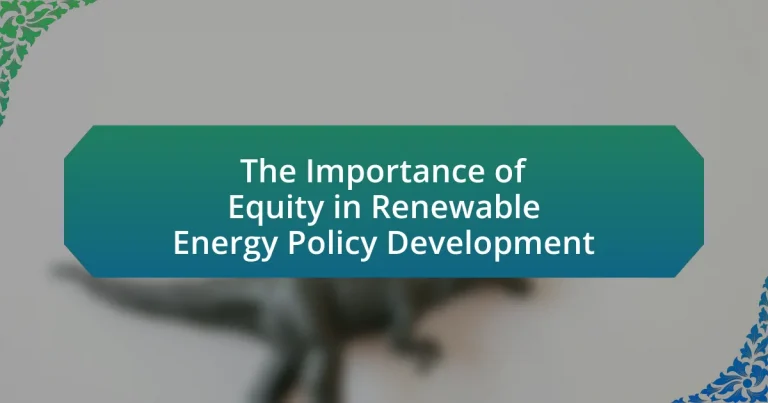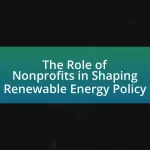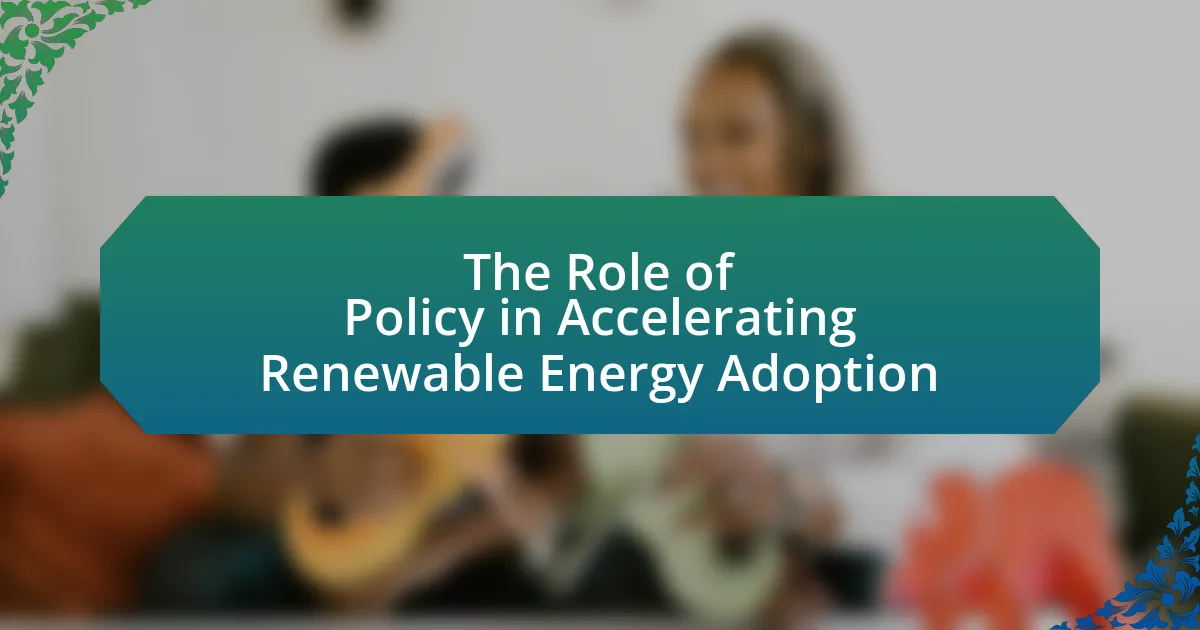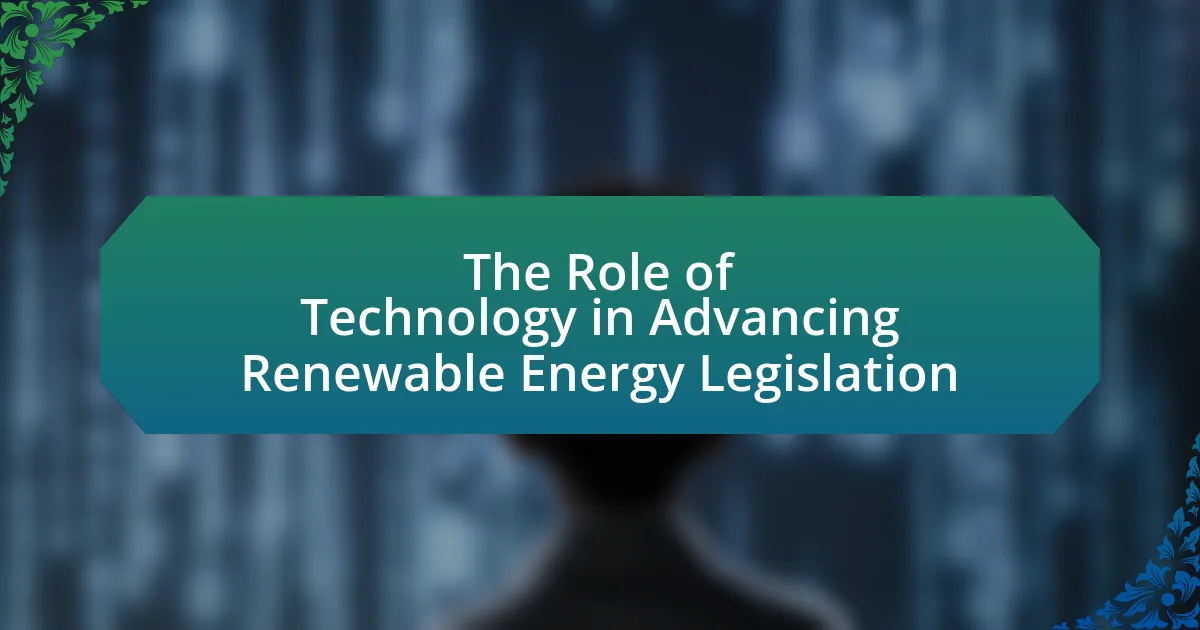Equity in renewable energy policy development is essential for ensuring fair access to energy resources and benefits, particularly for marginalized and low-income communities. This article explores the significance of equity in reducing energy poverty, promoting social justice, and enhancing community resilience against climate change. Key principles of equity, such as fairness, accessibility, and inclusivity, are discussed, along with the impact of public participation and data-driven approaches in policy formulation. The article also addresses the challenges and barriers to achieving equity, highlighting successful case studies and practical strategies for stakeholders to promote equitable outcomes in renewable energy initiatives.
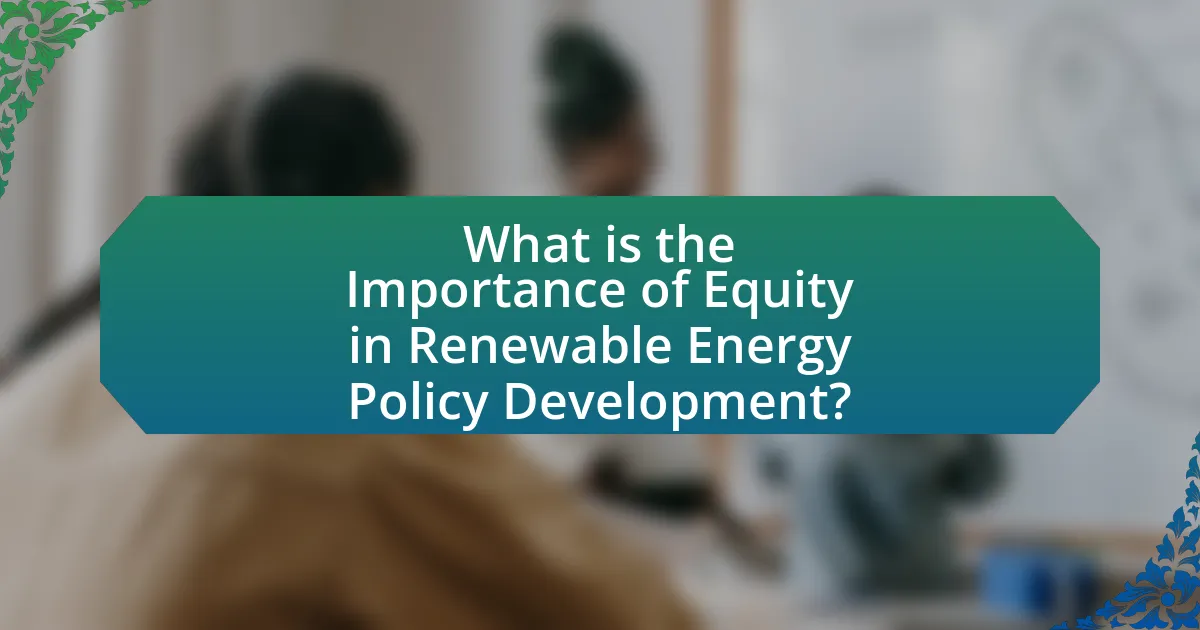
What is the Importance of Equity in Renewable Energy Policy Development?
Equity in renewable energy policy development is crucial because it ensures fair access to energy resources and benefits for all communities, particularly marginalized and low-income populations. This importance is underscored by the fact that equitable policies can help reduce energy poverty, promote social justice, and enhance community resilience against climate change impacts. For instance, studies show that inclusive energy policies can lead to a more balanced distribution of renewable energy investments, which in turn fosters economic opportunities and job creation in underserved areas. By prioritizing equity, policymakers can create a more sustainable and just energy transition that addresses historical inequalities and promotes broader societal benefits.
Why is equity a critical consideration in renewable energy policies?
Equity is a critical consideration in renewable energy policies because it ensures fair access to energy resources and benefits for all communities, particularly marginalized groups. This focus on equity addresses historical injustices and disparities in energy access, which can exacerbate social and economic inequalities. For instance, studies show that low-income households often face higher energy burdens, spending a larger percentage of their income on energy costs compared to wealthier households. By incorporating equity into renewable energy policies, governments can promote inclusive participation in the energy transition, ensuring that all populations benefit from clean energy initiatives and reducing the risk of further marginalization.
What are the key principles of equity in this context?
The key principles of equity in the context of renewable energy policy development include fairness, accessibility, and inclusivity. Fairness ensures that all stakeholders, particularly marginalized communities, have equal access to the benefits of renewable energy initiatives. Accessibility emphasizes the need for affordable energy solutions that do not disproportionately burden low-income households. Inclusivity involves actively engaging diverse community voices in the decision-making process to ensure that policies reflect the needs and priorities of all affected groups. These principles are essential for creating a just transition to renewable energy that addresses social and economic disparities.
How does equity impact access to renewable energy resources?
Equity significantly impacts access to renewable energy resources by ensuring that marginalized and low-income communities receive fair opportunities to benefit from these technologies. When equity is prioritized in renewable energy policy, it leads to targeted investments in infrastructure, subsidies, and incentives that specifically address the needs of underserved populations. For instance, studies show that equitable policies can increase access to solar energy for low-income households, which historically have been excluded from such benefits due to high upfront costs. According to the National Renewable Energy Laboratory, equitable access initiatives can reduce energy poverty and promote community resilience, demonstrating that equity not only enhances access but also fosters broader societal benefits.
How does equity influence the effectiveness of renewable energy policies?
Equity significantly influences the effectiveness of renewable energy policies by ensuring that all communities, particularly marginalized ones, have access to the benefits of these policies. When renewable energy initiatives are designed with equity in mind, they promote inclusive participation, which leads to broader public support and higher adoption rates. For instance, studies show that equitable policies can increase access to renewable energy technologies among low-income households, thereby enhancing overall energy efficiency and reducing energy poverty. This is evidenced by programs like California’s Solar on Multifamily Affordable Housing, which has successfully increased solar adoption in low-income communities, demonstrating that equitable approaches can lead to more effective and sustainable energy transitions.
What role does public participation play in equitable policy development?
Public participation is essential in equitable policy development as it ensures that diverse voices and perspectives are included in the decision-making process. This inclusivity helps to identify and address the needs and concerns of marginalized communities, leading to more just and effective policies. Research indicates that when public participation is integrated into policy development, it enhances transparency and accountability, fostering trust between policymakers and the community. For instance, the United Nations Development Programme highlights that participatory approaches can lead to better outcomes in energy policy by aligning initiatives with the actual needs of the population, thereby promoting equity in access to renewable energy resources.
How can equity enhance the sustainability of renewable energy initiatives?
Equity enhances the sustainability of renewable energy initiatives by ensuring that all communities, particularly marginalized ones, have access to the benefits of renewable energy technologies. When equity is prioritized, it leads to inclusive policy development that addresses the needs and concerns of diverse populations, fostering greater public support and participation. Research indicates that equitable access to renewable energy can increase adoption rates and community investment, as seen in programs like California’s Solar on Multifamily Affordable Housing initiative, which has successfully provided solar energy to low-income households, demonstrating a 20% increase in energy savings for participants. This inclusive approach not only promotes social justice but also strengthens the overall effectiveness and longevity of renewable energy projects by creating a broader base of stakeholders committed to their success.
What challenges exist in achieving equity in renewable energy policy?
Achieving equity in renewable energy policy faces several challenges, including socioeconomic disparities, access to technology, and regulatory barriers. Socioeconomic disparities often result in marginalized communities lacking the financial resources to invest in renewable technologies, which perpetuates energy poverty. Access to technology is uneven, with low-income households frequently unable to benefit from incentives like tax credits or rebates that are more accessible to wealthier individuals. Regulatory barriers, such as complex permitting processes and lack of inclusive stakeholder engagement, further hinder equitable policy implementation. For instance, a report by the International Renewable Energy Agency highlights that without targeted policies, disadvantaged groups may remain excluded from the benefits of the energy transition, exacerbating existing inequalities.
What are the barriers to equitable access in different communities?
Barriers to equitable access in different communities include socioeconomic disparities, geographic isolation, and systemic discrimination. Socioeconomic disparities often result in lower-income communities lacking the financial resources to invest in renewable energy technologies, such as solar panels, which can lead to higher energy costs and limited access to clean energy. Geographic isolation can hinder access to renewable energy infrastructure, particularly in rural areas where energy resources may be less developed. Systemic discrimination, including historical injustices and ongoing biases, can further marginalize certain communities, limiting their participation in energy policy discussions and access to funding opportunities. According to the U.S. Department of Energy, low-income households spend a higher percentage of their income on energy costs compared to wealthier households, highlighting the impact of these barriers on equitable access to energy resources.
How do socioeconomic factors affect equity in renewable energy?
Socioeconomic factors significantly affect equity in renewable energy by influencing access to resources, technology, and decision-making processes. Individuals from lower socioeconomic backgrounds often face barriers such as high upfront costs for renewable energy systems, limited access to financing options, and a lack of information about available technologies. For instance, a study by the National Renewable Energy Laboratory found that households with lower incomes are less likely to adopt solar energy due to these financial and informational barriers. Additionally, socioeconomic status can impact the ability to participate in policy discussions, leading to underrepresentation of marginalized communities in decision-making processes that shape renewable energy initiatives. This inequity can perpetuate existing disparities in energy access and affordability, ultimately hindering the transition to a more sustainable energy system.
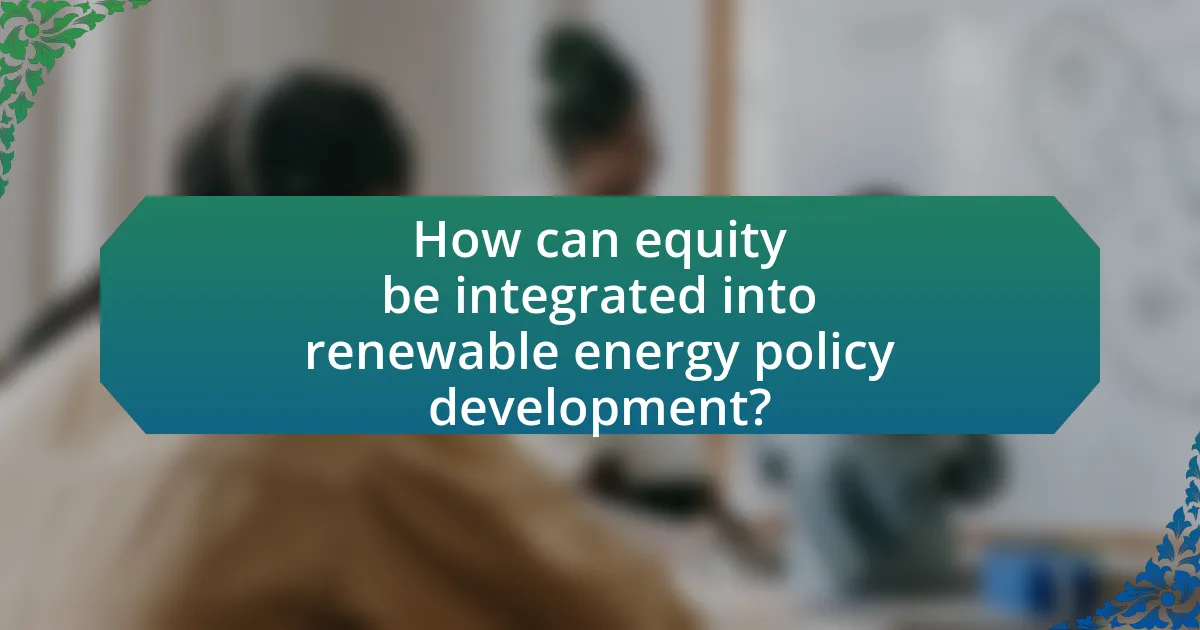
How can equity be integrated into renewable energy policy development?
Equity can be integrated into renewable energy policy development by ensuring that marginalized communities have access to decision-making processes and benefits from renewable energy projects. This can be achieved through inclusive stakeholder engagement, where diverse voices are represented, particularly those from low-income and minority populations who are often disproportionately affected by energy policies. Research indicates that policies incorporating equity considerations lead to more sustainable outcomes; for instance, the National Renewable Energy Laboratory found that equitable access to renewable energy can increase adoption rates in underserved communities by up to 30%. Additionally, implementing targeted financial incentives and support programs can help alleviate barriers to entry for these communities, ensuring they can participate in and benefit from the transition to renewable energy.
What strategies can policymakers use to promote equity?
Policymakers can promote equity by implementing targeted financial incentives and support programs for marginalized communities. These strategies include providing subsidies for renewable energy installations, offering low-interest loans for energy efficiency upgrades, and ensuring access to training programs in green technologies. For instance, the U.S. Department of Energy’s Solar Energy Technologies Office has initiatives specifically aimed at increasing solar access for low-income households, demonstrating a commitment to equitable energy transition. Additionally, integrating community engagement processes in policy development ensures that the voices of underrepresented groups are heard, leading to more inclusive decision-making. This approach is supported by research from the National Renewable Energy Laboratory, which highlights that equitable policies can enhance participation and benefit distribution in renewable energy projects.
How can stakeholder engagement improve equity in policy formulation?
Stakeholder engagement can improve equity in policy formulation by ensuring diverse perspectives are included in the decision-making process. This inclusivity allows for the identification of specific needs and challenges faced by marginalized communities, which can lead to more equitable policy outcomes. For instance, research by the National Renewable Energy Laboratory highlights that involving stakeholders from various socioeconomic backgrounds in renewable energy policy discussions results in policies that better address the energy needs of low-income households. By actively engaging these stakeholders, policymakers can create solutions that promote access to renewable energy resources, thereby enhancing equity in energy distribution and usage.
What best practices exist for ensuring equitable outcomes in renewable energy projects?
Best practices for ensuring equitable outcomes in renewable energy projects include stakeholder engagement, equitable distribution of benefits, and inclusive decision-making processes. Stakeholder engagement involves actively involving local communities, particularly marginalized groups, in the planning and implementation phases, which fosters transparency and trust. Equitable distribution of benefits ensures that all community members, especially those historically disadvantaged, receive fair access to energy resources and economic opportunities generated by these projects. Inclusive decision-making processes allow diverse voices to influence project outcomes, ensuring that the needs and concerns of all stakeholders are addressed. Research indicates that projects incorporating these practices lead to higher community acceptance and better long-term sustainability, as evidenced by case studies in various regions where equitable frameworks have been successfully implemented.
What role do data and research play in promoting equity?
Data and research play a critical role in promoting equity by providing evidence-based insights that inform policy decisions and resource allocation. They enable stakeholders to identify disparities in access to renewable energy resources and services, ensuring that marginalized communities receive the support they need. For instance, studies such as the “Equity in Energy Transition” report by the International Renewable Energy Agency highlight how data on energy access can reveal gaps in service delivery, allowing policymakers to target interventions effectively. This targeted approach is essential for creating equitable renewable energy policies that address the unique challenges faced by different communities.
How can data collection inform equitable policy decisions?
Data collection can inform equitable policy decisions by providing evidence-based insights into the needs and challenges faced by diverse communities. For instance, comprehensive data on energy access disparities can reveal which populations lack reliable renewable energy sources, enabling policymakers to target resources effectively. Research from the National Renewable Energy Laboratory indicates that data-driven approaches can lead to more inclusive energy policies that address the specific barriers faced by marginalized groups, ultimately fostering greater equity in renewable energy access and implementation.
What types of research are essential for understanding equity in renewable energy?
Essential types of research for understanding equity in renewable energy include quantitative studies on access and affordability, qualitative research on community perspectives, and policy analysis evaluating the impact of renewable energy initiatives on marginalized groups. Quantitative studies provide statistical data on energy access disparities, such as the 2020 report by the U.S. Energy Information Administration, which highlighted that low-income households spend a higher percentage of their income on energy costs. Qualitative research, like the work by the Institute for Local Self-Reliance, gathers insights from affected communities, revealing barriers to participation in renewable energy programs. Policy analysis, such as the research conducted by the National Renewable Energy Laboratory, assesses how existing policies may perpetuate inequities, ensuring that solutions are inclusive and equitable.
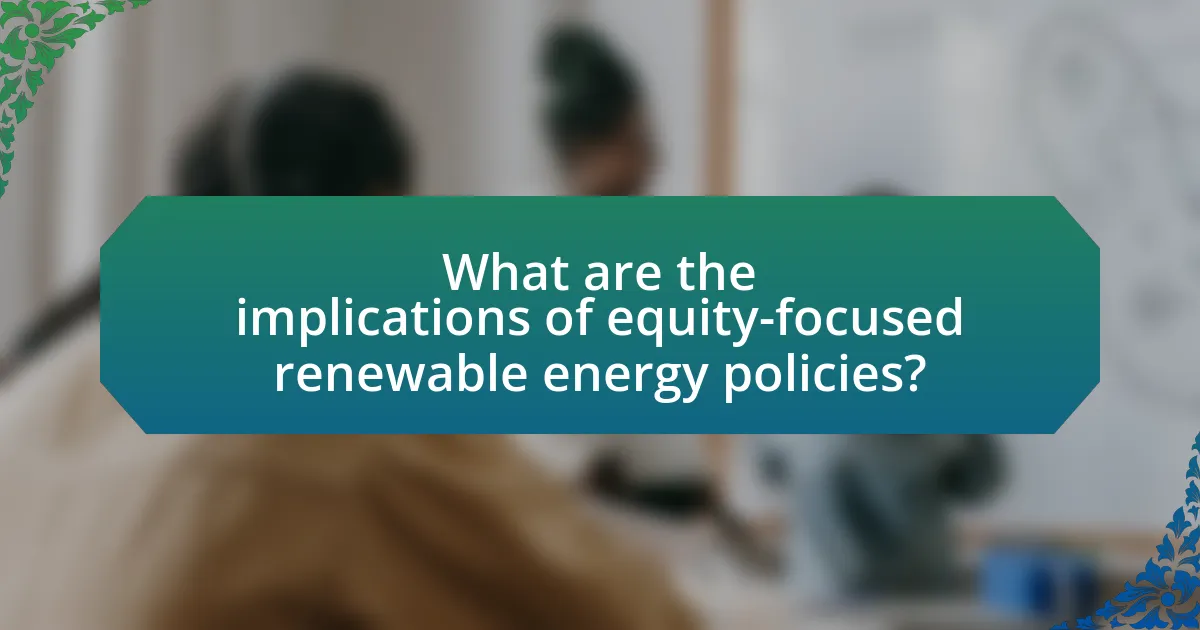
What are the implications of equity-focused renewable energy policies?
Equity-focused renewable energy policies aim to ensure fair access to clean energy resources and benefits for all communities, particularly marginalized groups. These policies can lead to increased energy access, reduced energy poverty, and enhanced social equity by prioritizing investments in underserved areas. For instance, research by the International Renewable Energy Agency (IRENA) indicates that equitable energy policies can improve economic opportunities and health outcomes for disadvantaged populations, thereby fostering community resilience and participation in the energy transition. Additionally, such policies can stimulate local job creation in renewable energy sectors, contributing to sustainable economic growth while addressing historical inequalities in energy access.
How does equity in renewable energy policy affect social justice?
Equity in renewable energy policy significantly enhances social justice by ensuring that marginalized communities have equal access to clean energy resources and benefits. When policies prioritize equity, they address historical injustices and disparities in energy access, which often disproportionately affect low-income and minority populations. For instance, studies show that equitable renewable energy initiatives can lead to job creation in underserved areas, improve health outcomes by reducing pollution, and lower energy costs for vulnerable households. The National Renewable Energy Laboratory reported that inclusive policies can increase participation in the clean energy economy, thereby fostering economic empowerment and social equity.
What are the long-term benefits of equitable renewable energy access?
Equitable renewable energy access leads to sustainable economic growth, improved public health, and enhanced social equity. By ensuring that all communities, particularly marginalized ones, have access to renewable energy sources, economic opportunities are created through job training and employment in green technologies. For instance, a study by the International Renewable Energy Agency (IRENA) found that the renewable energy sector could create 24 million jobs globally by 2030, significantly benefiting disadvantaged communities. Additionally, equitable access reduces reliance on fossil fuels, which in turn decreases air pollution and associated health risks, leading to long-term public health benefits. Furthermore, equitable energy access fosters social equity by empowering communities to participate in energy decision-making processes, thus promoting inclusive governance and reducing energy poverty.
How can equity contribute to economic development in underserved areas?
Equity can significantly contribute to economic development in underserved areas by ensuring that all community members have access to resources, opportunities, and decision-making processes. When equity is prioritized, it leads to inclusive policies that promote job creation, access to education, and investment in local infrastructure. For instance, studies show that equitable access to renewable energy resources can lower energy costs and create green jobs, which are essential for economic growth in these regions. According to the National Renewable Energy Laboratory, equitable renewable energy policies can increase local employment by up to 20% in underserved communities, demonstrating a direct link between equity and economic development.
What lessons can be learned from successful equity initiatives in renewable energy?
Successful equity initiatives in renewable energy demonstrate the importance of inclusive stakeholder engagement, which ensures that diverse community voices are heard and considered in decision-making processes. For instance, the Solar Equity Initiative in California has shown that involving low-income communities in the planning and implementation of solar projects leads to increased access to renewable energy and economic benefits for those communities. Additionally, data from the National Renewable Energy Laboratory indicates that equitable access to renewable energy can reduce energy costs for marginalized groups, thereby promoting social justice and economic resilience. These lessons highlight that prioritizing equity not only enhances project success but also fosters broader societal benefits.
What case studies exemplify effective equity integration in renewable energy policies?
Case studies that exemplify effective equity integration in renewable energy policies include the California Solar Initiative and the New York Clean Energy Standard. The California Solar Initiative, launched in 2007, aimed to increase solar energy use while ensuring access for low-income households, resulting in over 1,000 megawatts of installed solar capacity and significant participation from disadvantaged communities. The New York Clean Energy Standard, implemented in 2016, mandates that 50% of the state’s electricity come from renewable sources by 2030, with specific provisions to support low-income and marginalized communities through job training and energy efficiency programs. These initiatives demonstrate how equity can be effectively integrated into renewable energy policies, ensuring that all communities benefit from the transition to clean energy.
How can these lessons be applied to future policy development?
Lessons from equity-focused renewable energy policies can be applied to future policy development by ensuring inclusive stakeholder engagement and equitable resource distribution. For instance, policies that prioritize marginalized communities in access to renewable energy technologies can lead to more sustainable and just outcomes. Research indicates that equitable policies not only enhance social acceptance but also improve overall project success rates, as seen in the implementation of community solar programs in various states, which have increased participation among low-income households by over 30%. By integrating these lessons, future policies can foster greater equity, enhance community resilience, and drive broader adoption of renewable energy solutions.
What practical steps can stakeholders take to promote equity in renewable energy?
Stakeholders can promote equity in renewable energy by implementing inclusive policy frameworks that prioritize marginalized communities. This includes ensuring equitable access to renewable energy technologies, such as solar panels and wind turbines, through financial assistance programs and community-based initiatives. For instance, the Solar Energy Industries Association reported that community solar projects can provide low-income households with access to solar energy, reducing energy costs and promoting energy independence. Additionally, stakeholders should engage in participatory planning processes that involve local communities in decision-making, ensuring that their needs and perspectives are considered. Research from the National Renewable Energy Laboratory highlights that inclusive stakeholder engagement leads to more equitable outcomes in energy policy. By focusing on these practical steps, stakeholders can effectively address disparities and foster a more equitable renewable energy landscape.
How can individuals and organizations advocate for equitable policies?
Individuals and organizations can advocate for equitable policies by actively engaging in policy discussions, forming coalitions, and utilizing data to highlight disparities. Engaging in policy discussions allows stakeholders to voice their concerns and propose solutions that address inequities in renewable energy access. Forming coalitions with diverse groups amplifies their influence and fosters a united front for equitable policy change. Utilizing data, such as the 2021 report from the International Renewable Energy Agency, which shows that marginalized communities often face higher energy costs and limited access to renewable resources, provides concrete evidence to support advocacy efforts. This combination of engagement, collaboration, and data-driven arguments strengthens the case for equitable policies in renewable energy development.
What resources are available for promoting equity in renewable energy initiatives?
Resources available for promoting equity in renewable energy initiatives include funding programs, policy frameworks, and community engagement tools. For instance, the U.S. Department of Energy offers grants and technical assistance specifically aimed at underserved communities to enhance their access to renewable energy technologies. Additionally, organizations like the Clean Energy States Alliance provide resources and best practices for equitable energy transition, ensuring that marginalized groups benefit from renewable energy projects. Research indicates that equitable policies can lead to increased participation of diverse communities in the renewable energy sector, thereby fostering a more inclusive energy landscape.
